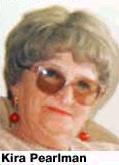|
|
||||
|
|
||||
| Home | Contents | Site Map | Links | Search |

|
|
|
The No. 20 bus after the explosion (walk4israel.com)
|
Kira Perlman, 67, was taking her eight-year-old grandson Ilan to school during the Thursday morning rush. They boarded the No. 20 bus in southern Jerusalem, in the neighborhood of Ir Ganim ("City of Gardens"). Kira and her family immigrated from Russia eleven years ago. Ever since the bombings began Kira would take her grandson everywhere, trying whenever she could to avoid rush hours, when bombers are most likely to strike. Ilan's third-grade friends became used to seeing her, and like Ilan they would call her "Babushka" ("Grandma").

|
Zhenya Axelrode, Kira's mother, is 92 years old. Her husband and her sister were murdered by the Nazis. But until that day she still had Kira, whom she managed to save when the Nazis invaded the Ukraine.
Also aboard the bus that day was Nael abu Hilayel, 23, from the village of Khader on the West Bank just south of Bethlehem. He was a very religious young man, who often attended prayers at the mosque and could recite from memory entire passages from the Qur'an.

|
Hilayel walked into the middle of the crowded bus. Not even the bus driver, a 24-year veteran who was trained to be attentive, noticed the explosive belt Hilayel concealed beneath his clothing.
The explosion caused the floors of nearby apartments to shake. It blew out almost every window in the bus. Screws and ball bearings flew like bullets. A fire also ignited, judging from the burns observed on several of the bodies. One young passenger who survived said, "It was like a jungle of smoke and fire and blood."
"They do this against children," the sister of another survivor said. "If they did it at 10 o'clock, it would be people going downtown to shop. But at this hour, it is kids on the bus."

|
|
|
A policeman collects the scattered books of schoolchildren (walk4israel.com)
|
Eleven were killed on that bus, at least four of them schoolchildren. About 50 people were wounded, half of them under 18 years old.
Black body bags lined the sidewalk, each tagged with a number. Religious volunteers carefully searched the debris, looking among the scattered schoolbooks, backpacks, and sandwiches to make sure they retrieved every last scrap of human flesh.
"Thank God he sacrificed his life for the sake of Palestine," Hilayel's mother Fatima said.

|
|
|
Hamas supporters raise their hands and chant Islamic slogans during a rally in Gaza City cheering the attack (AP)
|
Ilan's teacher waited for him to show up, wondering why he was late for school. When she found out the reason, she took a tranquilizer before announcing it to her class. Then they talked about Ilan, remembering how he wanted to be a lawyer.
Ilan's mother Galina herself survived a suicide bombing last March at the supermarket where she worked. When she went to identify the bodies of her son and mother-in-law, she fainted. "I don't understand how this is possible," she wept aloud. "He's only an eight-year-old boy."
The day after the attack people celebrated in Gaza with rallies and parades.
Seven hundred Israelis have died since the Palestinians responded with violence to the Clinton/Barak peace offer.
Have schoolchildren become so dangerous to the Arab way of life that they must now be considered deliberate targets?
Sources:
Dan, Uri. "Modern-Day Anguish for Matriarch of Holocaust Family." The New York Post, November 24, 2002.
Fisher, Ian. "Bombed Bus Had many Schoolchildren." The New York Times, November 22, 2002.
Wilkinson, Tracy. "A New Jolt to Israeli Politics." The Los Angeles Times, November 22, 2002.
Israeli-Palestinian Conflict:
Peace with Realism